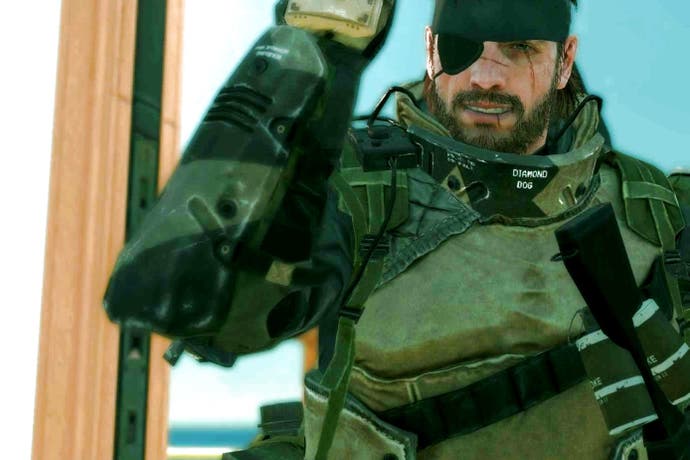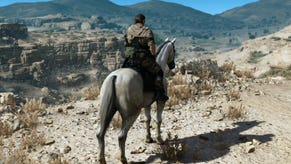All about that base: Metal Gear Solid 5's FOBs are glorious
And the microtransactions aren't an issue, yet.
Metal Gear Solid 5 has a dedicated online component that is yet to launch, Metal Gear Online, but multiplayer is already worked through the campaign's fabric in the form of Forward Operating Bases. Every player gets one FOB that exists as part of their main save, which can be customised and is basically another Mother Base. This can be invaded by others - and so too can you shoot for theirs.
FOB missions are built around the Mother Base layout that players have already learned in the campaign. It looks like an oil rig, basically, with plenty of see-through flooring and vertical height in a compact space. But even before invading there's a decision to be made about approach, one familiar to hunters throughout the ages: where's the low-hanging fruit?
Scrolling to the FOB missions tab in your iDroid offers a list of potential targets, and a quick time limit. Other players are being served up these targets too, and FOBs can only be invaded by one player at a time, so you have to skip through the options fast and identify the plum targets - my rule of thumb is the amount of Precious Metal on-board, and if it's over 10,000 we're going in.
Beyond this there is further nuance to your invasion. If you pick a target and are confirmed as the invader, you can check what each platform on the base has in the way of troop numbers, static defence, and resources. You can see what the troops are armed with, whether there are floating drones or mines or laser tripwires, and just choose to go elsewhere. With a sharp eye you can invade very rich people with an incredibly well-defended core platform, and hoover up tonnes of resources from their FOB's poorly-guarded outlying platforms.
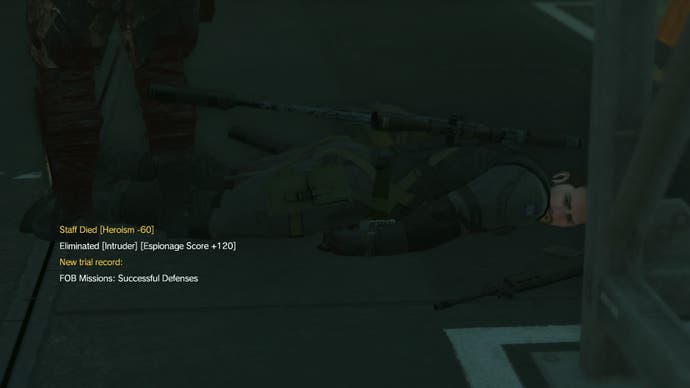
All of this applies equally to your own FOB. At first it's just a central platform holding a small amount of resources but, as you expand it, the strategy begins to align with your usual round of Mother Base development. Certain weapons are equippable by security staff (whereas many can only be used by the player) and so prioritising these tech trees is all of a sudden very desirable. There are also dedicated security devices that can be developed for FOB protection: mines, tripwires, security cameras, resource alarms and perimeter-scanning UAVs. And once you've sorted out all the kit, you have to decide staffing levels and how much to invest in those security devices. Obviously everyone would like to have 50 guards armed to the teeth at all times, but soon the number of platforms and spread of resources across them makes this a costly comfort blanket.
The reader may consider that from myself, Captain Fantastic of Noob-Pwn University, such fascination with the numbers betrays a certain cowardice. But FOB invasions are an appropriate avenue for unusual caution, because you are dicing with death - and inviting the ultimate asymmetric engagement. The red hot core of FOB invasions is that, really, the invader's the one who can end up in serious trouble.
The atmosphere is completely different from invasions in the Souls games, clearly one of the big inspirations. There the invader acts in concert with the game as it already exists, adding the sheer danger of a human opponent into a relentlessly hostile world. NPCs won't attack the invader, but will still attack the host player. It's a powerful position to be in, and one of the reasons invasions can be such bowel-trembling experiences.
With Metal Gear Solid 5's FOB missions you begin as the invader, but if the owner of that FOB (or one of their allies) is online then they can choose to accept an 'emergency mission' and swoop in to help with the defence. I'd estimate this happens around 2/3rds of the time. Until that point the invading player has 25 minutes to rinse as many resources and staff as they can from the target FOB.
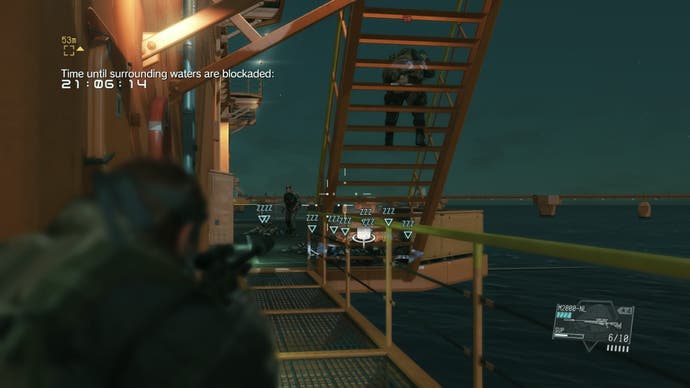
Already we can see how this is layering risk and tension over Metal Gear Solid 5's core mechanics. Any Big Boss worth their salt can take out six guards at a checkpoint, given a few minutes and some sneaky sneak. But when invading an FOB you always feel the Sword of Damocles dangling above, meaning efficiency becomes crucial. It's not about being pretty, but about abusing the mechanics as much as possible to get guards down fast. Everything you manage to steal before a defence is triggered stays stolen, and the guards will not respawn, so this honeymoon period means everything in terms of levelling-out the battlefield.
Players can choose to become allies within the FOB part of Metal Gear Solid 5's world, which amounts to watching over each other's FOBs, which is why defenders are common - and when one appears, the game changes. The notification of their arrival is accompanied by a kind of soft reset - you're put back to the starting position, but anything you've already nicked or killed remains gone, and the defender spawns at the very top. The defender's starting point is next to the 'command room' that, if reached when no enemies are in alert mode, triggers a win for the invader. All the defender has to do is kill the invader, or stop them reaching this point.
Everything is stacked in the defending player's favour. Not only do they have an army of intelligent AI soldiers acting as backup, for whom they can act as spotter, but whereas invaders only have one life a defender can respawn (a punishing timer means this can't be abused, but is still a big factor.) The defender can see icons representing their troops and quickly see when they've been knocked out or killed. In one of the most brilliant aesthetic touches, when the invader is spotted the game goes into Reflex mode for them - a few seconds of slowdown during which they have the chance to take out the spotter - and also for the defender, whether they're face-to-face or across the base.
So this is where bad boys get a spanking: the invader is now playing against a stacked deck. This is so much the case that, if sufficient troops are still around, the defender can simply play as spotter from the structure's top - watching areas where guards are going down and trying to tag the invader for the alert, whereupon the AI soldiers often finish the job. The majority of my kills in FOB missions have involved rushing down a panicked invader at the head of an AI army. It feels magnificent.

The fact that this is a likely ending for all invaders soon becomes its own little metagame. In my first few FOB missions I took tranq guns and non-lethal gadgets aplenty, because the intention was to steal soldiers. Very quickly it becomes clear that this kind of load-out won't do, because the average defender comes into their FOB toting grenade launchers and other lethal long-range weaponry. It's an amazing thing because it forces big choices that you can't row back from: if you take in loads of lethal weaponry for the worst-case scenario, which you kind of have to, you lose options for subduing and kidnapping guards. If you forego the sneaking suit for the battle dress uniform, which gives more HP, you're going to be more easily spotted in a situation where a bit of extra health probably won't make a difference. If you go in like Arnie with a grenade launcher and rockets, then they turn up on the roof with a sniper rifle, you're in a bad place.
This element of forward-planning suits Metal Gear Solid 5 so well because, where Peace Walker and Metal Gear Solid 4 had enormous weapon variety but little incentive to explore it, the FOB missions make you look at this range of options in a new way. It becomes about building the most versatile kit possible, something that will let you breeze through undefended FOBs like a ghost, but has stopping power when things get real. It invites you to start considering using unsuppressed snipers, because they have a higher fire rate, or the close-quarters efficiency of SMGs versus the luxury of a long-range assault rifle. And as you play and kill and are killed by all manner of tools, these opinions are ever-shifting.
The design's asymmetry is what makes everything work, because this is a mode where players create their own challenge. The odds are so in favour of defenders that less skilled players have an avenue through which they can legitimately beat a 'better' player, and earn plenty of ransom money. So too do the slightly higher rewards from invading tempt dedicated and more skilled players to put themselves at a disadvantage.
What the FOB missions manage to create is something like a Metal Gear scenario generator. There are few feelings like the illicit joy one takes in an undefended FOB: Big Boss giving a masterclass and leaving with every soldier kidnapped, every resource container lifted, every device disabled. The switch from this atmosphere, which is always how FOB missions begin, into cutthroat PvP is one of the reasons it feels so great - you just never know when that twist of the knife is coming, and what kind of fight's coming your way.
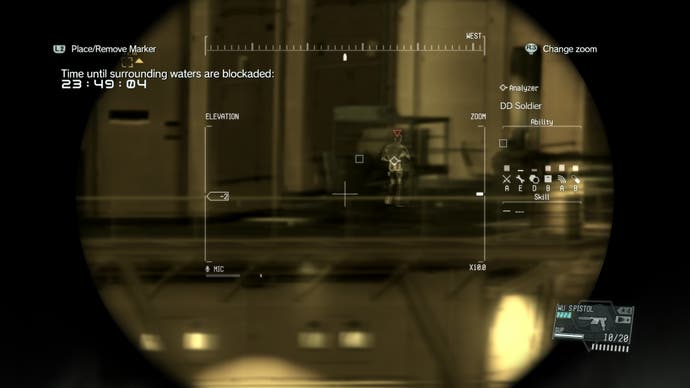
Whether this excitement will fade over time, who knows, but one thing that may age rapidly is the setting. Each player's customisation dictates what you'll find on platforms but, sadly, the layouts remain the same. There is variation in the number of levels, as players build up their FOBs, and obviously a level 1 platform with no security is unrecognisable from a level 4 platform crammed with devices and guards. But it's hard to say how this will play out over time: the few layouts could become boringly familiar, or the constant differences in enemy presence could keep things fresh.
So too will we have to wait and see on the dreaded microtransactions. The rule with the FOBs is that your first one's free, and if you want more then pony up - around £8 seems to be the going rate for enough 'MB coins' to buy a second FOB. I haven't felt the need for a second FOB, because I've had my first up and running for just over a week and it's still relatively undeveloped. It feels like unnecessary duplication, and so the microtransactions aren't annoying to me so much as irrelevant - but that feeling may change as the weeks pass. Certainly the presence of a paid-for element in a game with a premium pricetag, regardless of how incidental or superfluous it may be, is not to be applauded. When the launch is dogged by server issues, as it was for Metal Gear Solid 5, the impression left is even worse.
The design of Metal Gear Solid 5's FOB missions, however, has to get a standing ovation. There is enormous value to be wrung out of putting players on an unequal footing in multiplayer, and this is the crux of why FOBs feel great. They can be joyous heists, where our plucky hero makes off scot-free with a juicy score, or transition into mini-gauntlets against a player backed up by an AI army. From the defending side, they're a glorious opportunity to bring overwhelming force to bear on a dirty thief and bag a fat ransom. Then in the middle you have that huge range of wonderful gadgets and guns, all waiting to be used in some unexpected manner. In the variety of encounters they create, and the smarts required from the participants, FOB missions really do feel like Tactical Espionage Action.
